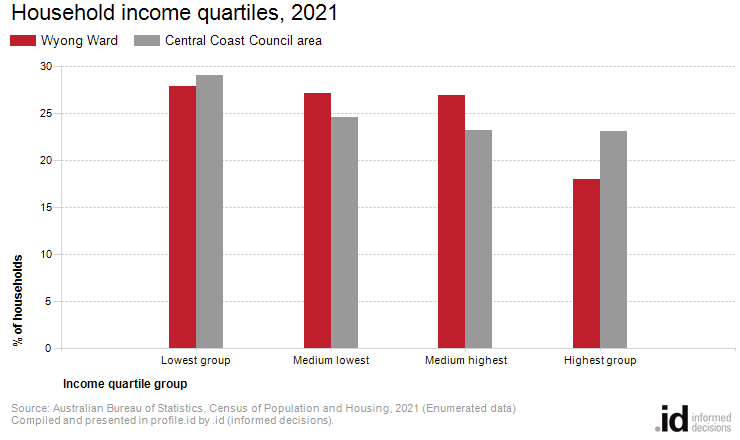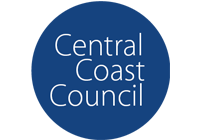Wyong Ward
Household income quartiles
In Wyong Ward, the 'lowest' quartile was the largest group in 2021, comprising 28% of households with income.
Households form the common 'economic unit' in our society. Household Income is one of the most important indicators of socio-economic status. With other data sources, such as Qualifications and Occupation, it helps to reveal Wyong Ward's socio-economic status and economic opportunities. Household income levels are not comparable over time because of the influences of economic change such as wage level fluctuations and inflation. The income quartile method is a powerful and objective way of looking at income data and in particular, how it is changing.
A detailed explanation of how Household Income quartiles are calculated and interpreted is available in specific data notes.
Learn more about the characteristics of low-income households here.
Derived from the Census question:
'What is the total of all wages/salaries, government benefits, pensions, allowances and other income the person usually receives?'
Households
| Household income quartiles | ||||||||
|---|---|---|---|---|---|---|---|---|
| Wyong Ward - Households (Enumerated) | 2021 | 2006 | Change | |||||
| Quartile group | Number | % | Central Coast Council area % | Number | % | Central Coast Council area % | 2006 to 2021 | |
| Lowest group | 7,042 | 27.9 | 29.0 | 31001 | 4,925 | 25.7 | 31.8 | +2,117 |
| Medium lowest | 6,857 | 27.2 | 24.6 | 31002 | 5,195 | 27.1 | 25.5 | +1,663 |
| Medium highest | 6,797 | 26.9 | 23.2 | 31003 | 5,352 | 27.9 | 22.1 | +1,445 |
| Highest group | 4,555 | 18.0 | 23.2 | 31004 | 3,690 | 19.3 | 20.6 | +865 |
| Total Households | 25,253 | 100.0 | 100.0 | 19,163 | 100.0 | 100.0 | +6,090 | |
Source: Australian Bureau of Statistics, Census of Population and Housing (opens a new window) 2006 and 2021. Compiled and presented by .id (opens a new window)(informed decisions).
(Enumerated data)
| Household income - Quartile group dollar ranges | |||||||
|---|---|---|---|---|---|---|---|
| Calculated from income data for New South Wales | Weekly income by Census year | ||||||
| Household income ranges | 2021 | 2016 | 2011 | 2006 | 2001 | 1996 | 1991 |
| Lowest group | $0 to $886 | $0 to $750 | $0 to $614 | $0 to $530 | $0 to $418 | $0 to $337 | $0 to $303 |
| Medium lowest | $887 to $1,824 | $751 to $1,481 | $615 to $1,233 | $531 to $1,034 | $419 to $828 | $338 to $652 | $304 to $587 |
| Medium highest | $1,825 to $3,134 | $1,482 to $2,554 | $1,234 to $2,272 | $1,035 to $1,788 | $829 to $1,462 | $653 to $1,146 | $588 to $981 |
| Highest group | $3,135 and over | $2,555 and over | $2,273 and over | $1,789 and over | $1,463 and over | $1,147 and over | $982 and over |

Compiled and presented in profile.id by .id (informed decisions).

Compiled and presented in profile.id by .id (informed decisions).
Dominant groups
Income quartiles allow us to compare relative income-earning capabilities across time. Analysis of the distribution of households by income quartile in Wyong Ward compared to Central Coast Council area shows that there was lesser proportion of households in the highest income quartile as well as a lesser proportion in the lowest income quartile.
Emerging groups
The most significant change in Wyong Ward between 2006 and 2021 was in the lowest quartile which showed an increase of 2,117 households.
